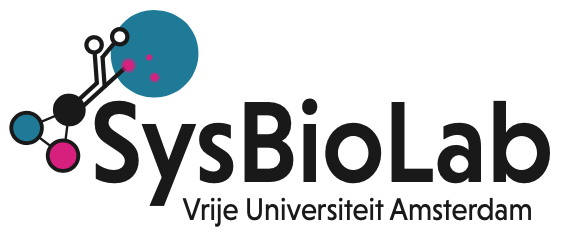Maaike and Pranas participated in the third summer school on Economic Principles in Cell Biology that took place on the 8-11th July, 2024, in Paris and online. Lab PhD students Francesco and Luis also attended the lectures online. Maaike was one of some 30 participants selected for in-person attendance, and Pranas gave one of the
Lab News
Since cells have finite biosynthetic resources for protein synthesis, a rise in one protein concentration is generally at the expense of that of others. A logical consequence is then that phenotypic traits trade-off: cells cannot excel at everything. They cannot grow fast and be very stress tolerant and adaptive to new conditions at the same
Some time ago, we started an initiative in the lab to collect all the best (and worst) practices on how to reconstruct, curate, and simulate genome-scale metabolic models (GEMs). A total of 7 colleagues, including a visiting PhD student Gioele Lazzari from the University of Verona, and a MSc rotation student Steven Wijnen, have put
Microbiologists are searching for a universal theory of how bacteria form communities based not on their species but on the roles they play. A new article in the popular science magazine Quanta has highlighted our work on metabolic preferences and their genomic markers. How can we identify rules of microbial communities? What are the traits
The Netherlands Organisation for Scientific Research (NWO) granted the FERMI Perspective proposal led by Herwig Bachmann from the Systems Biology Lab. The project aims to accelerate the protein transition by improving the taste of plant-based products through fermentation by microbes. With colleagues from the Wageningen University and TU Delft and 10 industrial partners, the project
Which metabolic enzymes should a cell change in concentration to give rise to a large change in steady-state metabolic flux? Which enzymes should an experimentalist inhibit to reduce the flux the most? Why are some kinase-phosphatase couples in cellular signal transduction ultra-sensitive to changes in signals, while others are not? What is the function of
Bacteria grow in communities of many co-occurring species in , e.g., in your gut, in soil, or in the ocean. A fundamental process in these communities (more specifically, communities of heterotrophic bacteria, i.e., bacteria that utilize organic carbon sources) is that bacteria take up substrates (basically, food) like sugars and amino acids from the environment
A custom of our lab is to start the academic year with a state-of-the-union day at the Hortus Botanicus of Amsterdam. During this day, the PIs give an research overview of the last year, an outlook on the coming year, current duties, and their long-term research vision in the presence of the research (support) staff
Together with Ralf Steuer (Humboldt-University of Berlin, Germany) we recently wrote a review for Bioessays, see https://doi.org/10.1002/bies.202300015. It addresses how we currently view the consequences of finite biosynthetic resources (for protein expression) for cellular tasks such as stress tolerance, growth and adaptation to new conditions. We focus on Escherichia coli and Saccharomyces cerevisiae. We acknowledge
In primate species, a change in lifestyle leads to adjustments in their microbiome. What does this mean? Over the last years, ARTIS Micropia Professor Remco Kort and his Bioinformatics & Systems Biology student Isabel Houtkamp studied the faeces of the western lowland gorilla. They did this by comparing the composition of the microbiome of the ARTIS gorillas
Lab news
- Summer school “Economic Principles in Cell Biology”
- How genetic circuits can optimally tune metabolic protein concentrations
- Our take on the practical aspects of genome-scale modeling
- Our research featured in Quanta Magazine
- Herwig to lead €5M NWO Perspective Grant Consortium for plant-based fermentations
Recent Posts
- Summer school “Economic Principles in Cell Biology”
- How genetic circuits can optimally tune metabolic protein concentrations
- Our take on the practical aspects of genome-scale modeling
- Our research featured in Quanta Magazine
- Herwig to lead €5M NWO Perspective Grant Consortium for plant-based fermentations
Archives
- July 2024
- April 2024
- February 2024
- January 2024
- November 2023
- September 2023
- August 2023
- July 2023
- June 2023
- May 2023
- April 2023
- March 2023
- February 2023
- December 2022
- November 2022
- May 2022
- April 2022
- March 2022
- February 2022
- September 2021
- May 2021
- April 2021
- December 2020
- October 2020
- September 2020
- May 2020
- February 2020
- December 2019
- November 2019
- September 2019
- August 2019
- July 2019
- June 2019
- May 2019
- April 2019
- February 2019
- November 2018
- October 2018
- June 2018
- May 2018
- March 2018
- February 2018
- January 2018
- November 2017
- October 2017
- August 2017
- July 2017
- June 2017
- May 2017
- April 2017
- March 2017
- January 2017
- December 2016
- September 2016
- August 2016
- July 2016
- June 2016
- May 2016
- April 2016
- March 2016
- February 2016
- January 2016
- December 2015
- November 2015
- September 2015
- July 2015
- April 2015

Recent Comments